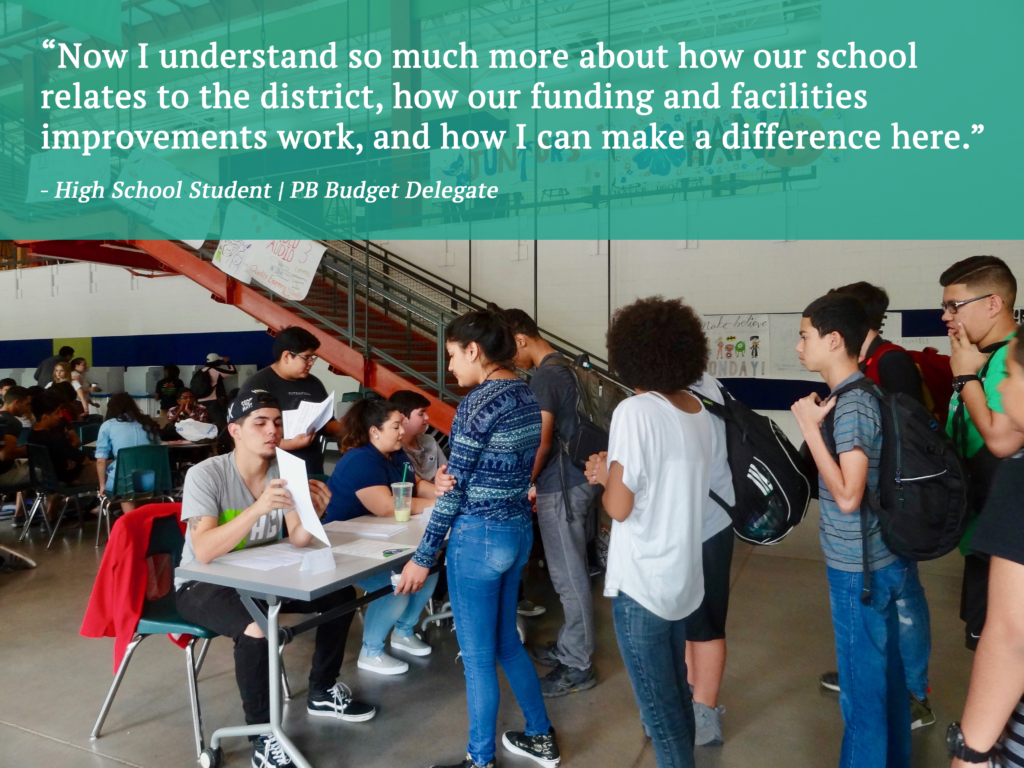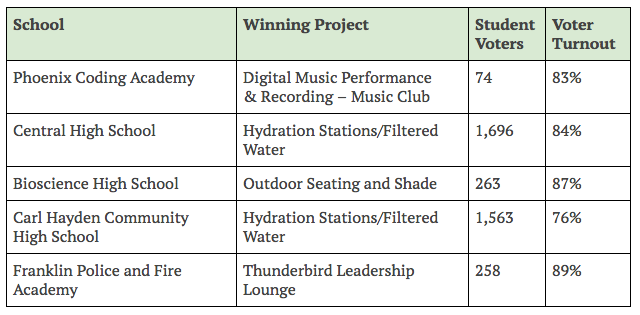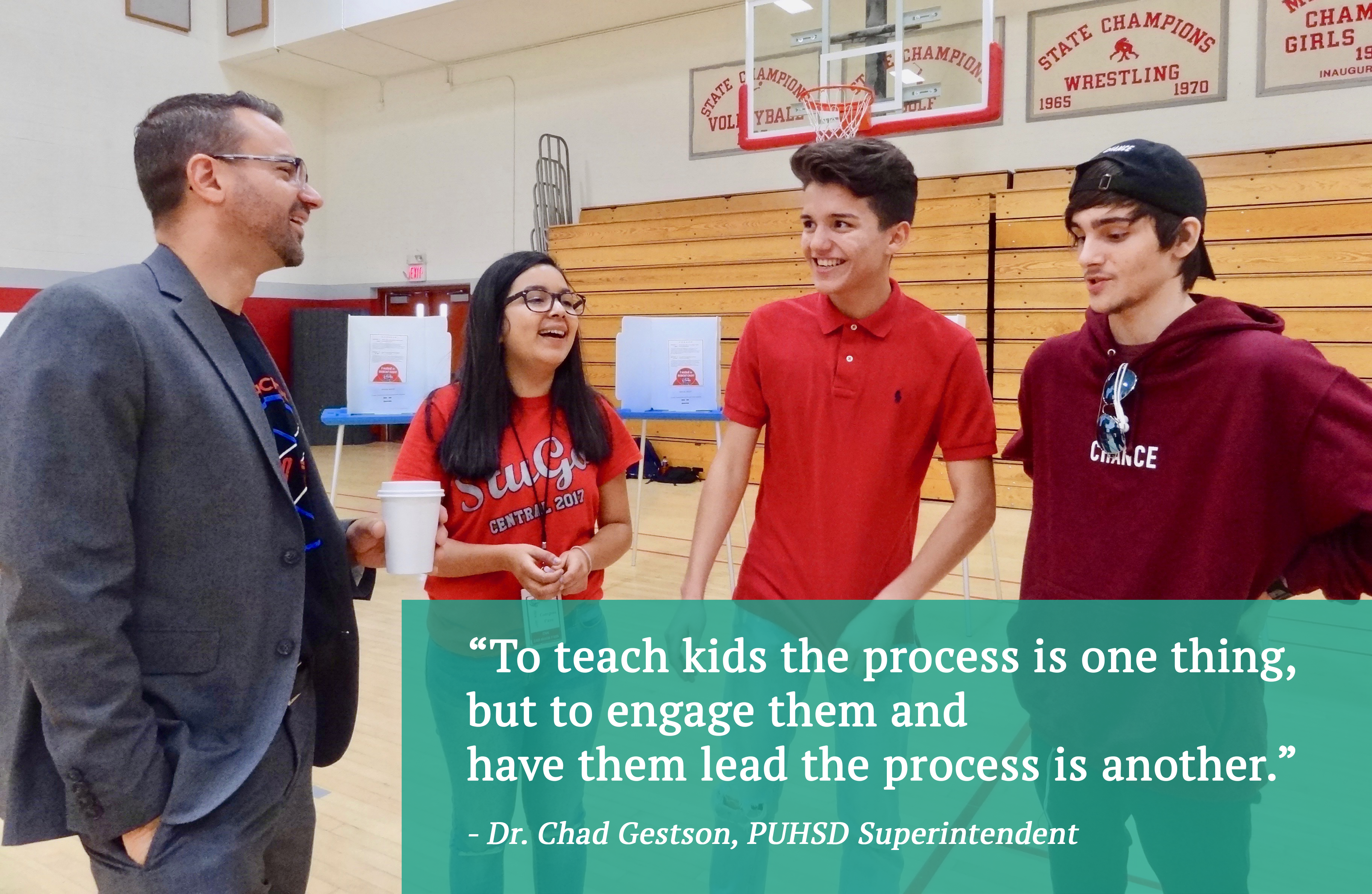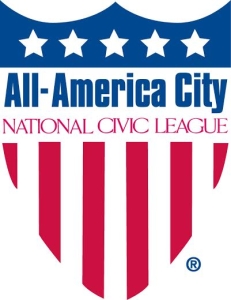We are proud to share that the Participatory Budgeting Project – an NCDD member org – recently completed the first-ever school district-wide participatory budgeting in Phoenix, AZ, and it was a huge success. The process empowered over 3,500 students to deliberate and vote on how to spend $26,000 of district money, and the project’s success is already being looked to as a model for more school PB processes in the future. It’s a great win for teaching D&D practices to more young people! We encourage you to read more about how it went in the PBP blog update below or find the original here.
What Happens When Students Lead PB?
 “Let’s rock and roll!” shouted Christopher Oglesby, Assistant Principal at Carl Hayden Community High School, to a team huddle of 30 spirited students. The group dispersed in all directions and prepared to welcome over 1,500 student voters to the gym.
“Let’s rock and roll!” shouted Christopher Oglesby, Assistant Principal at Carl Hayden Community High School, to a team huddle of 30 spirited students. The group dispersed in all directions and prepared to welcome over 1,500 student voters to the gym.
This team of student leaders – along with school district staff, nonprofit partners, and volunteers – met just before the Phoenix sunrise to set up thousands of ballots and stickers, 40 voting booths, dozens of blue and gold posters, eight voter check-in stations, three display boards, and two official Maricopa County vote machines.
During this workshop, students, teachers, and staff from five public high schools in the Phoenix Union High School District (PUHSD) learned about PB, and began planning how students in each school would directly decide on how to spend part of the school district’s budget. Six months ago, in September of 2016, we kicked off the school year in Phoenix with an introductory workshop on participatory budgeting (PB) – a democratic process in which local people directly decide how to spend part of a public budget.
PUHSD was the first school district in the U.S. to do school PB with district-wide funds. Since their introduction to PB in September, five schools have worked through six months of trainings, outreach efforts, idea collection events, and meetings with district staff to transform ideas about ways to improve their schools into project proposals. These student-led efforts culminated with an entire week of voting – five voting days that each began before the sun came up.
Making history in Phoenix made for deep learning about school PB
As the school district begins implementing winning projects at each school, we’re reflecting on the outcomes we’ve already seen beyond projects themselves. During Vote Week Dr. Chad Gestson, PUHSD Superintendent, said,
“If there are any schools or districts across the country that are thinking about doing school PB, in our opinion it’s a no-brainer.”
Impacts from this district-wide initiative underscore Dr. Gestson’s point, and highlight the potential for PB to create similar outcomes for students, teachers, school district staff, and beyond. When schools or school districts use PB to empower their students to decide how to spend the dollars that impact their daily lives, everyone wins.
Students
PB helped students build friendships across grade levels. Many students talked about the ways being involved in PB increased their own self-confidence and ability to talk with fellow students about how to improve their school.
Teachers
Teachers who stepped up to advise PB at each school developed stronger relationships with students outside their regular classes, and enjoyed seeing students learn and lead with great creativity and compassion throughout the PB process.
School District Staff
The PUHSD Executive Director of Logistics was so excited to see so much student interest in school maintenance and facilities that he’s planning to incorporate student input and participation into school improvement initiatives beyond the winning PB projects – including repainting some of the schools and renovating cafeterias.
Beyond PUHSD
City staff and community organizers from the City of Phoenix and the City of Tempe, and from as far away as Fresno, CA, and Toronto, Ontario attended a vote walkthrough and panel discussion with students, teachers, and staff involved in PB. These staff members and community organizers were excited by the work happening in the school district, and several are already planning for ways to bring PB to their communities!
And the winning projects are…
Drumroll, please!
During Vote Week, 3,854 students in five public high schools – an average of over 80% turnout rate – directly decided how to spend $26,000 in school district funds. Students voted to fund music programs, filtered water stations, shade structures, and a study lounge.

Teamwork made this dream work
In any community, a successful PB process is built on strong collaboration.
PUHSD PB took teamwork to the next level, and established partnerships across Phoenix that have already inspired other school districts and cities to reimagine ways to work together.
During Vote Week, the Maricopa County Recorder’s Office generously partnered with PUHSD; they provided voting booths, official vote machines and ballots, and staff support for each voting day. In doing so, County Recorder Adrian Fontes and his office created a voting experience that embodied real democracy just as an election does – and in some ways did so even better.
Recorder Fontes has confidence that “there are other elected officials around the country just like [him] who would be more than happy to come on out and help support these sorts of elections with staff and equipment.”
“[PB] is part of education that’s not testable” he said, “isn’t this one of the most important aspects of our American democracy?”
Beyond support from an elected official, local partners from across Phoenix came together with commitment and creativity to support this student-driven initiative. This successful Vote Week was due in great part to the time, talent, and remarkable volunteers from the Center for the Future of Arizona, One Arizona, Mi Familia Vota, and Arizona State University.
Telemundo, NPR’s KJZZ, and Arizona PBS each covered Vote Week, and produced compelling news reports linked below:
Cronkite News AZ PBS’s coverage of Phoenix Union High School District PB process goes from 16:00 – 17:45 in this video.
More coverage of the first PB process with school district funds from 91.5 KJZZ.
What’s next for Phoenix?
We’ll wrap up this pilot year in PUHSD with a PB Celebration and Participatory Evaluation Workshop in May – where students, teachers, and staff from all five schools will come together to celebrate their work, reflect on what was challenging and what can be improved, and share ideas and plans for next year.

What’s next for you?
At PBP, we’re excited to see the movement for PB in schools continue to spread across Phoenix, and beyond! Our guide to PB in schools is supporting the growth of PB in schools around the world – download it here to take action.
How can we work together to bring PB to your community?
If you’re interested in more in-depth support from PBP to launch PB in your school, contact Ashley Brennan at ashley@participatorybudgeting.org.
You can find the original version of this Participatory Budgeting Project piece at www.participatorybudgeting.org/what-happens-when-students-lead-pb.









